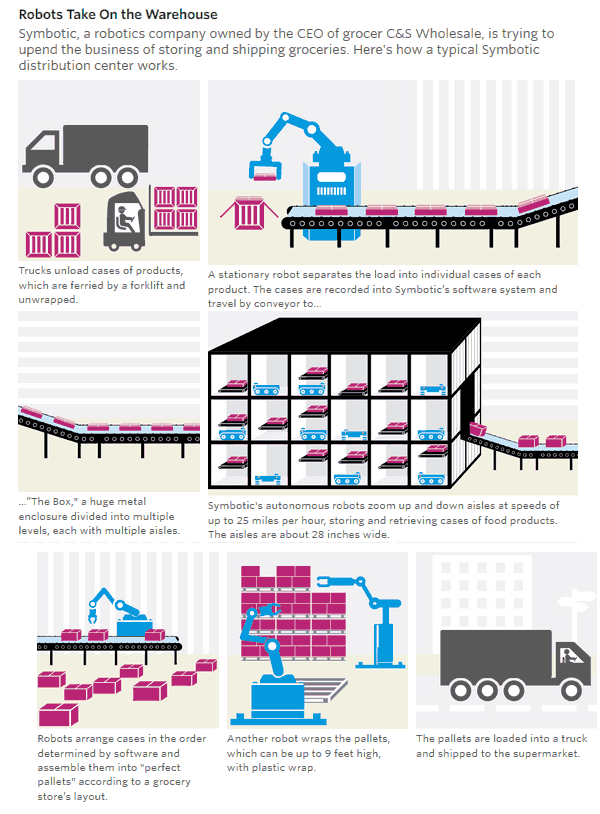Many years ago, Supply Chain Digest wrote about the potential for two paths for DC automation.
The first path was for DCs with very low levels of automation, which would provide flexibility over time and the ability to scale up for peak periods by using temporary labor in the facility.
Supply Chain Digest Says... |
|
|
The other path would be a very highly automated one, in which a variety of very advanced materials handling technologies would combine to provide systems that had a very low labor content even when compared to traditional mechanization DC systems, such as batch pick-to-belt followed by downstream sortation, the staple of hundreds or thousands of distribution center s today. (See The Two Paths for DC Automation.)
Perhaps a bit later than we envisioned, that predicted future state may indeed now be upon us.
As reported in the Wall Street Journal, Target stores has recently brought on-line a new DC in California that is very close to this highly automated future, rather than following its traditional DC design model.
It uses a system from a company called Symbotic, which interestingly was founded by Rick Cohen, CEO of C&S Wholesale Grocers, who developed the technology to automate the company's own DC operations, but is now marketing the solution to other retailers and wholesalers.
The exact design of course varies by facility, but in general the system features:
• Automatic depalletization of incoming pallets into the facility
• High density, automated storage in what Symbotic calls "The Box"
• Shuttle-like robots that can traverse the entire storage area, on to which individual cartons are pushed or pulled for storage and picking
• Robotic palletization of the cartons after picking, said to build "perfect pallets"
• Sophisticated software to control all this
This is represented in the graphic below, provided by the Wall Street Journal.
Typical System Design from Symbotic

Source: The Wall Street Journal
Each of Symbotic's autonomous robots working in The Box can drop off and retrieve one case of product per minute, about five times as fast as a human can on foot in pick aisles. The robots are 28 inches wide and the aisles they travel only slightly wider, compared with the 10-to-12-foot aisles of a conventional warehouse.
(See More Below)
|
CATEGORY SPONSOR: SOFTEON |
|
|
| |
|
|
Symbotic says in addition to the Target California DC, it has reached an agreement to supply the system to a Coca-Cola distribution facility in South Brunswick, N.J.
Walmart says it is testing Symbotic's system for use in up to two of its large distribution centers, with a special interesting in how the robots allow it to store more products in its warehouses.
Symbotic said its system allows food retailers and wholesalers to cut distribution center labor costs by as much as 80% and operate warehouses that are 25% to 40% smaller than traditional designs.
But that comes at a steep price, generally in the many tens of millions of dollars per facility.
Of course, Symbotic is not the only provider of such automation today, with somewhat similar offerings from Witron, Dematic, SSI Shaefer, Knapp and others.
All this as labor costs and especially availability continue to trouble distributors of all sorts. During a panel discussion at the CSCMP conference in Orlando last week, for example, Ohio State University's Steve DeNunzio noted that the overall unemployment rate in the popular distribution center area of Columbus, OH was 4%, putting pressure companies to come up with the 20-30,000 DC workers the area needs, depending on the season.
And that before two new Amazon DCs come on-line in the area, requiring another 3000 or so DC workers. DeNunzio says he has recently seen DC job postings topping $18 per hour in the area.
So perhaps DC automation will in fact finally address these labor issues, although on the same panel, Steve Reade, senior director of distribution for DSW Shoes, said he believed only about 20% of the company's DC operations could be fully automated.
But that is in the challenging shoe picking environment. In the full case-dominated world of food and beverage, that number is clearly much higher.
Are nearly fully automated DCs now really coming? How popular do they think it they will be? Let us know your thoughts at the Feedback section below or the link above to send an email.
Your Comments/Feedback
|